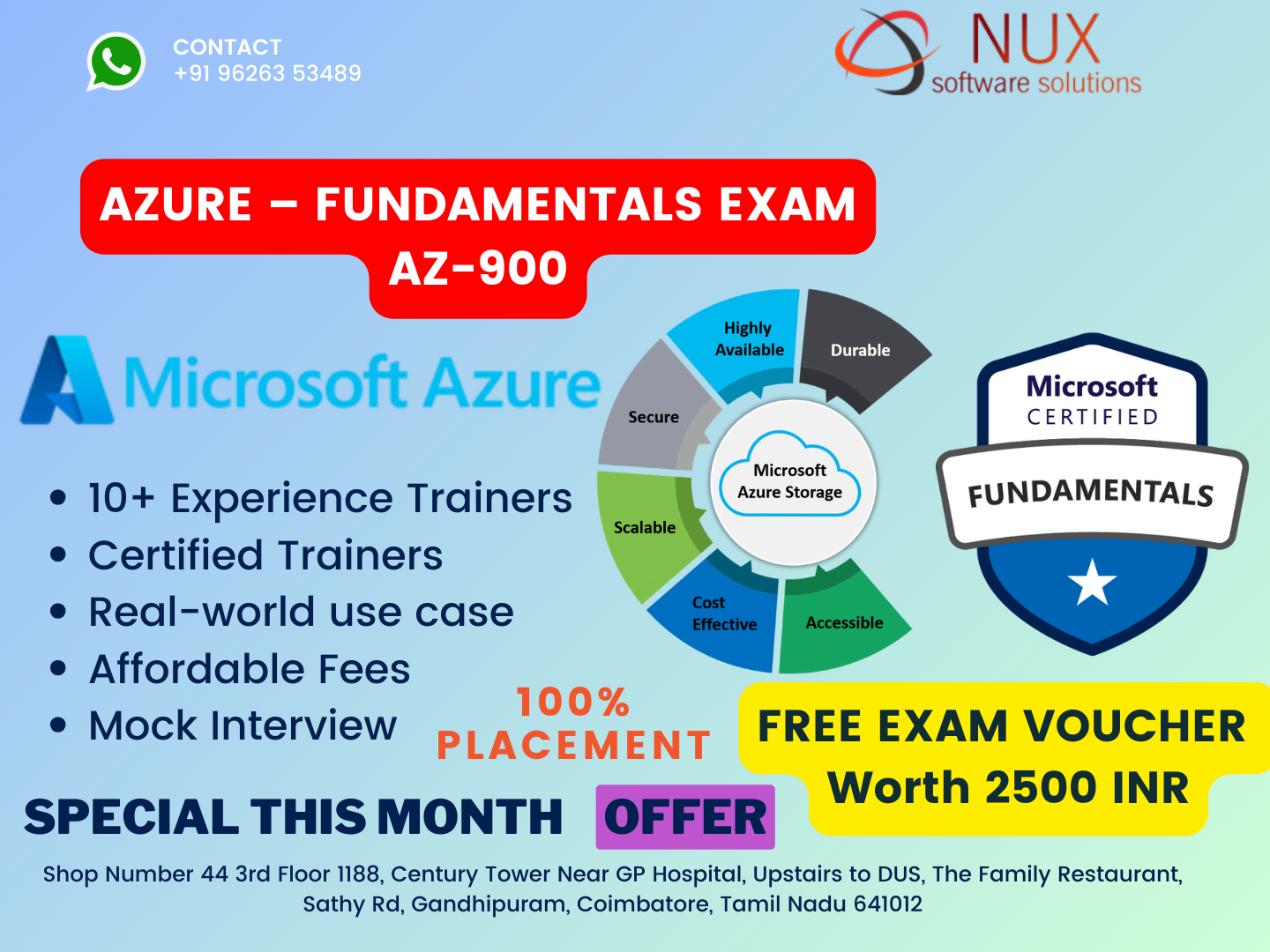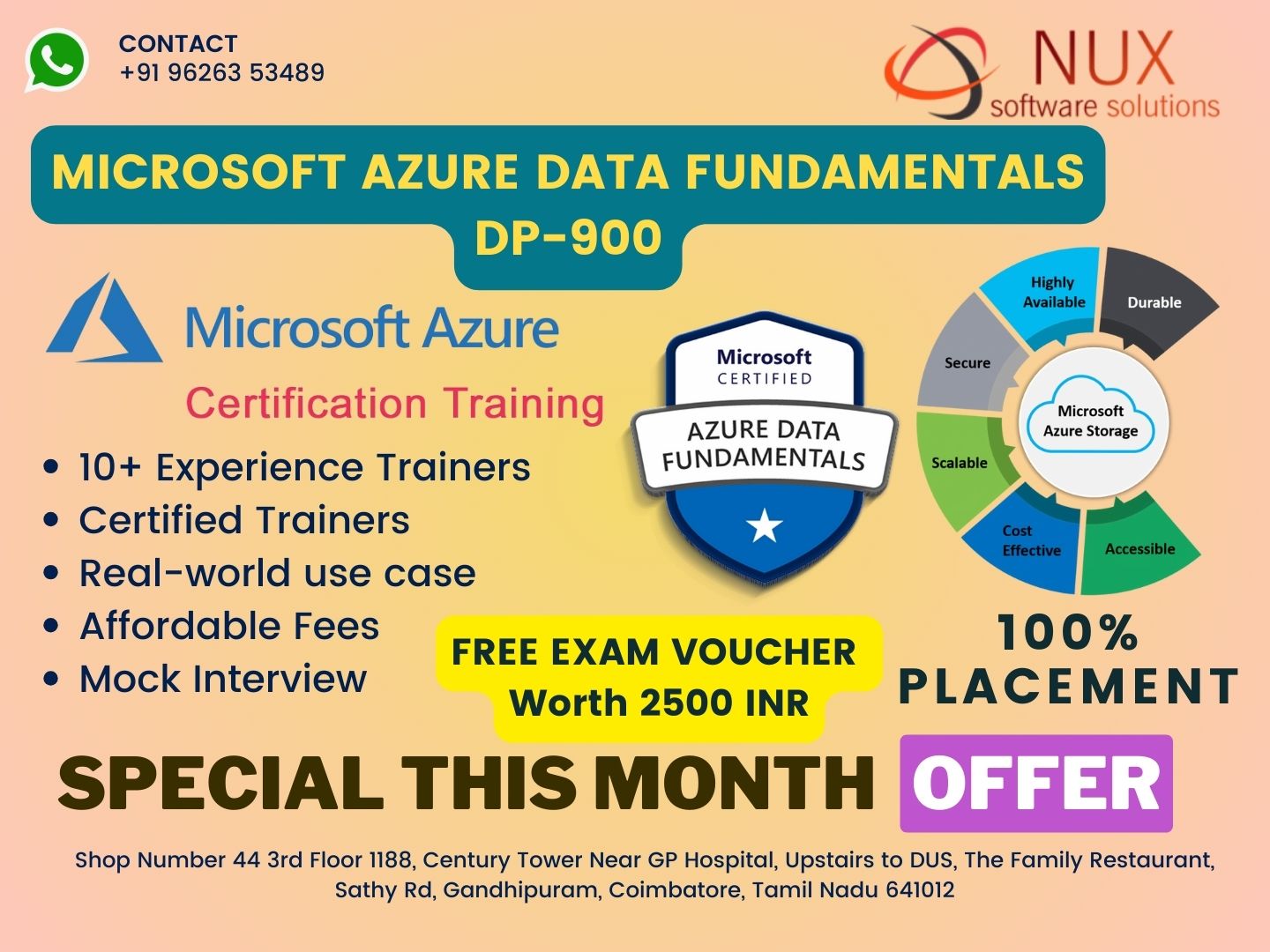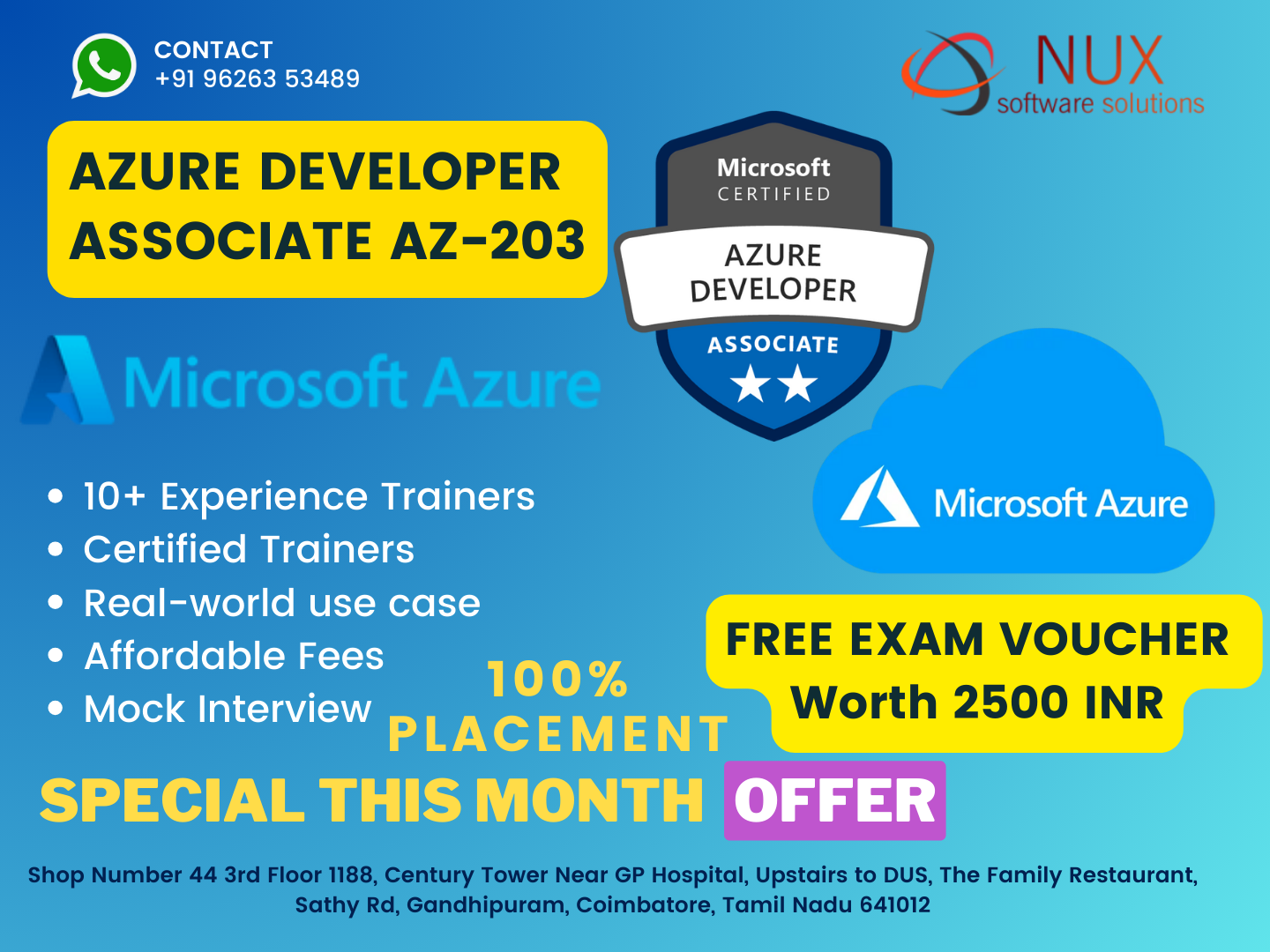Microsoft Azure – Fundamentals Exam AZ-900


Microsoft Azure AI – Fundamentals Exam AI-900 (beta) is one of the best cloud solutions available and in order to be an expert on this particular application Nux software Solutions is your one-stop destination. Over the years, we have been one of the premium institutes when it comes to rendering quality training in various domains of IT. We have a team of experts and highly qualified faculties who have been rendering quality training to our students.
The Microsoft Azure – Fundamentals Exam AZ-900
At Nux software Solutions, we have designed a highly customized and effective course material that is based in lab work and lots of hands-on application. We have made sure that our students got maximum practical exposure that would help them to achieve their goals in the professional fields.
Course Syllabus
MODULE 1 :
describe the benefits and considerations of using cloud services, describe terms such as High Availability, Scalability, Elasticity, Agility, Fault Tolerance, and Disaster Recovery, describe the principles of economies of scale, describe the differences between Capital Expenditure (CapEx) and Operational Expenditure (OpEx), describe the consumption-based model
MODULE 2 :
Describe the differences between Infrastructure-as-a-Service (IaaS), Platform-as-a-Service (PaaS) and Software-as-a-Service (SaaS), describe Infrastructure-as-a-Service (IaaS), describe Platform-as-a-Service (PaaS), describe Software-as-a-Service (SaaS), compare and contrast the three different service types
MODULE 3 :
Describe the differences between public, private and hybrid cloud models, describe public cloud, describe private cloud, describe hybrid cloud, compare and contrast the three different cloud models
MODULE 4 :
Describe core Azure services, Describe the core Azure architectural components, describe Regions, describe Availability Zones, describe Resource Groups, describe Azure Resource Manager, describe the benefits and usage of core Azure architectural components
MODULE 5 :
Describe some of the core products available in Azure, describe products available for Compute such as Virtual Machines, Virtual Machine Scale Sets, App Services, Azure Container Instances (ACI) and Azure Kubernetes Service (AKS), describe products available for Networking such as Virtual Network, Load Balancer, VPN Gateway, Application Gateway and Content Delivery Network, describe products available for Storage such as Blob Storage, Disk Storage, File Storage, and Archive Storage, describe products available for Databases such as Cosmos DB, Azure SQL Database, Azure Database for MySQL, Azure Database for PostgreSQL, Azure Database Migration service, describe the Azure Marketplace and its usage scenarios
MODULE 6 :
Describe some of the solutions available on Azure, describe Internet of Things (IoT) and products that are available for IoT on Azure such as IoT Hub and IoT Central, describe Big Data and Analytics and products that are available for Big Data and Analytics such as, HDInsight, and Azure Databricks, describe Artificial Intelligence (AI) and products that are available for AI such as Azure Machine Learning Service and Studio, describe Serverless computing and Azure products that are available for serverless computing such as Azure Functions, Logic Apps, and Event Grid, describe DevOps solutions available on Azure such as Azure DevOps and Azure DevTest Labs, describe the benefits and outcomes of using Azure solutions
MODULE 7 :
Describe Azure management tools, describe Azure tools such as Azure Portal, Azure PowerShell, Azure CLI and Cloud Shell, describe Azure Advisor
MODULE 8 :
Describe Security, Privacy, Compliance, and Trust, Describe securing network connectivity in Azure, describe Network Security Groups (NSG), describe Application Security Groups (ASG), describe User Defined Rules (UDR), describe Azure Firewall, describe Azure DDoS Protection, choose an appropriate Azure security solution
MODULE 9 :
Describe core Azure Identity services, describe the difference between authentication and authorization, describe Azure Active Directory, describe Azure Multi-Factor Authentication
MODULE 10 :
Describe security tools and features of Azure, describe Azure Security Center, describe Azure Security Center usage scenarios, describe Key Vault, describe Azure Information Protection (AIP), describe Azure Advanced Threat Protection (ATP)
MODULE 11 :
Describe Azure governance methodologies, describe policies and initiatives with Azure Policy, describe Role-Based Access Control (RBAC), describe Locks, describe Azure Advisor security assistance, describe Azure Blueprints
MODULE 12 :
Describe monitoring and reporting options in Azure, describe Azure Monitor, describe Azure Service Health, describe the use cases and benefits of Azure Monitor and Azure Service Health
MODULE 13 :
Describe privacy, compliance and data protection standards in Azure, describe industry compliance terms such as GDPR, ISO and NIST, describe the Microsoft Privacy Statement, describe the Trust center, describe the Service Trust Portal, describe Compliance Manager, determine if Azure is compliant for a business need, describe Azure Government cloud services, describe Azure China cloud services
MODULE 14 :
Describe Azure pricing, Service Level Agreements, and Lifecycles, Describe Azure subscriptions, describe an Azure subscription, describe the uses and options with Azure subscriptions such access control and offer types, describe subscription management using Management groups
MODULE 15 :
Describe planning and management of costs, describe options for purchasing Azure products and services, describe options around Azure Free account, describe the factors affecting costs such as resource types, services, locations, ingress and egress traffic, describe Zones for billing purposes, describe the Pricing calculator, describe the Total Cost of Ownership (TCO) calculator, describe best practices for minimizing Azure costs such as performing cost analysis, creating spending limits and quotas, using tags to identify cost owners, using Azure reservations and using Azure Advisor recommendations, describe Azure Cost Management
MODULE 16 :
Describe Azure Service Level Agreements (SLAs), describe a Service Level Agreement (SLA), describe Composite SLAs, describe how to determine an appropriate SLA for an application
MODULE 17 :
Describe service lifecycle in Azure, describe public and private preview features, describe the term General Availability (GA), describe how to monitor feature updates and product changes


